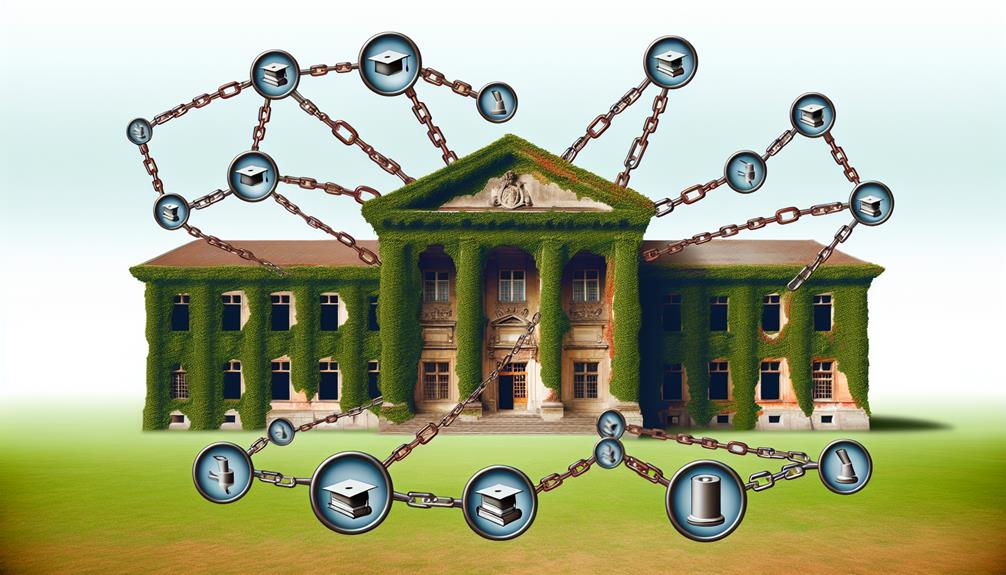Just like a solid foundation is key to constructing a sturdy building, backlinks are a crucial element in building a robust SEO strategy for higher education.
You might be asking, 'What's the big deal about backlinks?' Well, search engines like Google treat backlinks as votes of confidence, so the more high-quality backlinks your website has, the more likely it is to rank higher in search results. But it's not just about quantity – quality and relevance matter too.
As you navigate the digital landscape of higher education, you'll discover that building the right kind of backlinks can be a game-changer. Want to know how to go about it? Stick around, we're just getting started.
Key Takeaways
- Backlinks play a crucial role in higher education SEO by boosting visibility and credibility of institutions.
- Quality and relevance of backlinks are more important than quantity alone.
- Unethical backlinking tactics can result in penalties from search engines, hindering efforts to attract prospective students.
- Identifying and obtaining high-quality backlinks from authoritative and relevant sites is essential for SEO success in higher education.
Understanding the Importance of Backlinks

To boost your website's SEO ranking and visibility, it's crucial to understand the importance of backlinks in the world of higher education. Backlinks, links from other websites to yours, are like votes of confidence in your content. But, it's not just about quantity; the quality and relevance of those backlinks matter too.
Now, let's talk 'Backlink Ethics.' You can't just cheat your way to the top. It's essential to build honest, organic backlinks. That means creating valuable content that others want to link to and avoiding sketchy tactics like buying links. Think about it: these are your peers in the academic community. You wouldn't want to tarnish your reputation, would you?
This brings us to 'Backlink Risks.' Unethical backlinking can lead to penalties from search engines. If you're caught manipulating rankings, your site could be demoted or even removed from search results. Plus, low-quality or irrelevant links can harm your SEO. It's a risky game to play.
How Search Engines Evaluate Backlinks
Now, let's delve into how search engines evaluate backlinks, a process that's crucial for your site's SEO ranking. It isn't just about quantity anymore; quality and relevance are key factors too.
Search engines use a method called Link Valuation to assess your backlinks. Here's how it works:
- Relevance: Search engines value links from sites that are relevant to yours. They're more likely to consider a backlink as a vote of confidence if it comes from a source that's closely related to your content.
- Authority: A link from a well-respected and trusted site carries more weight than one from a lesser-known site. This is why getting backlinks from high-authority domains can significantly boost your rankings.
- Freshness: Fresh links are a sign of an active website, so search engines often give more credit to sites with fresh backlinks.
Be careful, though. You're at risk of Backlink Penalties if you try to game the system with spammy or low-quality links. It's important to focus on building authentic, high-quality backlinks to avoid penalties and improve your SEO ranking.
The Role of Backlinks in Higher Education SEO

Understanding how search engines evaluate backlinks sets the stage for appreciating their significant role in higher education SEO. When you create high-quality backlinks, you're essentially building bridges that lead potential students to your institution's website. This boosts your site's visibility and credibility, enhancing your online reputation.
However, it's crucial to understand Backlink Ethics. Not all backlinks are created equal. You must always strive for legitimacy and relevancy. Search engines can spot manipulative link-building tactics, so always aim for organic backlink growth. This means focusing on the quality of your backlinks rather than the quantity.
Neglecting Backlink Ethics can lead to Backlink Penalties. Search engines can drastically decrease your site's ranking or even remove it from search results. This could have a devastating impact on your institution's online presence, hindering your efforts to attract and engage prospective students.
Identifying High-Quality Backlink Opportunities
Spotting high-quality backlink opportunities is like uncovering hidden treasure; it's an essential skill you'll need to master in your SEO journey. But don't worry, it's not as hard as it might seem. You just need to know what to look for.
- Backlink metrics: They're the compass that guides you to high-quality backlink opportunities. Look for websites with high Domain Authority (DA) and Page Authority (PA). These sites have proven their reliability and influence in their field. A backlink from them can be a significant boost to your SEO.
- Anchor text optimization: It's crucial to ensure that the anchor text of your backlinks is relevant to your content. It should provide context and value to both your audience and search engines. Don't just settle for any backlink; make sure it's beneficial to your SEO strategy.
- Relevancy: Finally, the website you're getting a backlink from should be relevant to your niche. Search engines prioritize relevancy when ranking websites. A backlink from an unrelated site won't do you much good.
Strategies for Building Effective Backlinks

Let's dive into five proven strategies to build effective backlinks that can significantly enhance your SEO efforts.
1) Link Earning Techniques: This involves creating high-quality, valuable content that naturally earns links from other websites. You're not directly asking for links, but you're attracting them because your content is worth linking to. This method requires consistent effort, but it's worth it.
2) Outreach Strategies: This involves reaching out to other relevant websites and blogs to ask for a link back to your site. You can offer a reciprocal link, or even suggest a guest post where you can include your link. Remember, it's not about quantity, but quality.
3) Social Media: Use your social media platforms to share your content and attract natural backlinks.
4) Guest Posting: This is where you write a post for another website or blog, and include your link within that post.
5) Directory Submissions: Submit your website to relevant directories. This not only provides a backlink, but can also drive traffic to your site.
These strategies can be time-consuming but are essential for effective SEO. So, put in the effort, it'll pay off in the end.
Monitoring and Analyzing Your Backlink Profile
Once you've built your backlinks, it's crucial to monitor and analyze your backlink profile to ensure your SEO strategies are effective. Through consistent profile maintenance, you can identify areas of strength and weakness and adjust your strategies accordingly.
Here are three steps to efficiently monitor and analyze your backlink profile:
- Use Backlink Tools: There are several backlink tools available that can aid in monitoring your backlink profile. These tools analyze the quality and quantity of your backlinks, providing valuable insights into your SEO effectiveness.
- Analyze Your Backlinks: Once you've utilized backlink tools to gather data, it's time to analyze it. Look for any patterns, trends, or outliers. Are the majority of your backlinks coming from high-authority domains? If not, it's time to adjust your strategy.
- Maintain Your Profile: Regular profile maintenance is key. Routinely remove any low-quality or broken links, keeping your profile clean and effective.
Case Studies: Successful Backlink Strategies in Higher Education

Now that you're well-versed in monitoring and analyzing your backlink profile, let's examine some real-world examples of successful backlink strategies in higher education.
In one case, a university boosted its online visibility by focusing on backlink ethics. They only pursued high-quality, relevant backlinks, avoiding any link schemes that could harm their reputation. By doing so, they not only increased their search engine rankings but also established a strong, trustworthy online presence.
On the other hand, another institution maximized partnership opportunities to build backlinks. They collaborated with local businesses, offering guest posts on their websites, which included backlinks to the institution. This strategy not only expanded their backlink profile but also fostered strong community relationships.
Both these institutions succeeded because they understood the importance of ethical backlink building and the power of partnerships. They didn't just aim for more backlinks; they aimed for high-quality, relevant ones.
Conclusion
So, you've seen how crucial backlinks are in higher education SEO. They're not just fluff; search engines value them highly. In fact, Google reports 99.2% of sites appearing in top search results have at least one external link.
It's time you start identifying quality backlink opportunities, crafting strategies, and monitoring your backlink profile.
Remember, great backlinks can catapult your institution's online visibility, bringing in more prospective students.




